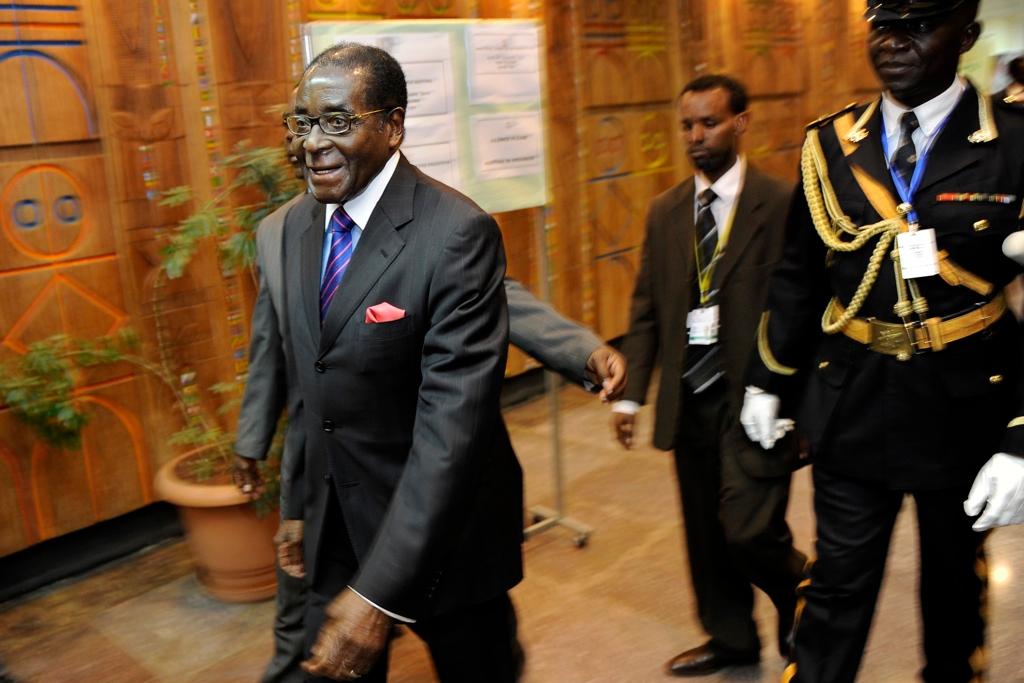New torture claims against Mugabe regime
Fresh allegations of torture have been made against Zimbabwean President Robert Mugabe’s government by 46 Zimbabweans charged with treason for watching videos of the Tunisian and Egyptian uprisings and allegedly plotting to overthrow the Harare regime. Here Mugabe arrives January 28, 2011 at the 16th ordinary session of the African Union, AU, in the Ethiopian capital, Addis Ababa.
New allegations of state torture by President Robert Mugabe's regime have been made by several of the 46 Zimbabweans currently in jail for watching videos of the Tunisian and Egyptian uprisings and allegedly plotting to overthrow the Harare government.
Human rights defenders and diplomats have denounced the treatment of those arrested. The Mugabe government has a long list of well-documented allegations of torture by police, army and state security agents.
Munyaradzi Gwisai, a law lecturer at the University of Zimbabwe, told a Harare magistrate he suffered “indescribable” pain inflicted by police and security agents who sought to force his “confession” that he plotted to overthrow President Robert Mugabe, according to a report from Harare by South Africa's IOL news service.
Gwisai and 45 other Zimbabwe human rights activists, academics and students, including 11 women, appeared in the Harare Magistrate’s Court on Thursday. They were arrested last weekend while attending a lecture titled “Revolt in Egypt and Tunisia. What lessons can be learnt by Zimbabwe and Africa.”
Gwisai told magistrate Munamato Mutevedzi that he and five detainees were whip-lashed on their stomachs and beaten as police and security agents sought their confessions. He said the pain was “indescribable, sadistic and a tragedy for Zimbabwe."
Defence lawyer Alec Muchadahama, trying to have charges against them dropped, said he counted “about 10 defendants walking and sitting with difficulty when they came to court.” He said: “We tried to get them admitted to hospital or be seen by a doctor but this was refused.”
Muchadahama told the court the arrest of the 46 was “unlawful” as they had not been informed why they were being detained. He said they were held in stinking police cells and only knew they were charged with treason minutes before they appeared in court for the first time on Wednesday.
After lengthy delays, the case was postponed until Monday when prosecutor Edmore Nyazamba will cross-examine Gwisai.
The detainees remain in custody.
Amnesty International Africa deputy director Michelle Kagari described the arrests as an “over-reaction” and an abuse of freedom of speech. “The safety of detainees remains a serious concern as the Law and Order Section at Harare Central Police station has become notorious for the torture and ill-treatment of activists in their custody,” Kagari said.
British ambassador to Harare Mark Canning denounced the treatment of the prisoners.
“I am deeply concerned by the arrest and treatment of Munyaradzi Gwisai and 44 fellow activists. It shows the continuing abuse of the legal system by elements of the state opposed to reform and basic human rights. The charge of treason levelled against the group for apparently watching footage of events in other countries which is readily and publicly available in the media is excessive and politically motivated," said Canning, according to The Zimbabwean newspaper.
"I am particularly disturbed by the failure to follow due process, including allowing the detainees timely access to their legal team and medical treatment, and allegations of torture at the hands of state security agents," said Canning. "These allegations must be investigated and the perpetrators brought to justice. The culture of impunity and state-sponsored abuses must be addressed if Zimbabwe is to embark on genuine healing and move forward. This episode follows a number of other recent cases of abuses.”
Every day, reporters and producers at The World are hard at work bringing you human-centered news from across the globe. But we can’t do it without you. We need your support to ensure we can continue this work for another year.
Make a gift today, and you’ll help us unlock a matching gift of $67,000!
